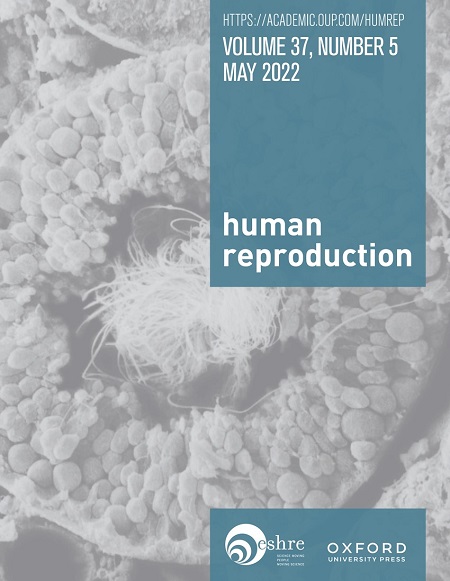精子DNA片段与年龄呈正相关,但可能不会直接影响IVF/ICSI结果
IF 6
1区 医学
Q1 OBSTETRICS & GYNECOLOGY
引用次数: 0
摘要
研究问题:精子DNA片段是否与男性年龄相关?精子DNA片段是否会直接影响IVF/ICSI的结果?高龄男性精子DNA片段化指数明显较高,但不同DNA片段化组的IVF/ICSI结果差异不显著。精子DNA断裂(SDF)是男性不育的常见原因,并可能影响辅助生殖技术治疗的结果。决定SDF的几个因素包括年龄、遗传和环境因素。试管受精/ICSI,其中每个单个精子被选择,已被证明可以解决精子数量少,精子活力和形态的问题。然而,SDF对IVF/ICSI结果的影响仍然存在争议。在这项研究中,我们的目的是确定年龄和SDF之间的相关性,并检查SDF对IVF/ICSI结果的影响。从2023年1月至2024年12月,精子计数≥2mL的男性不孕症患者如果具有以下条件之一,则应进行DSF检查:高龄(≥45岁),有不良习惯,如:吸烟≥3支/天,饮酒超过100 mL(按体积计酒精含量至少为25%)/天,不运动,或在高度危险的条件下工作(N = 899人)。分析了IVF/ICSI周期对临床妊娠的治疗结果。DSF测试使用基于精子染色质分散(SCD)技术的Halotech (Halotech)试剂盒。将患者分为低DSF组(DFI≤15%)、中等(DFI在15 ~ 30%之间)、高(DFI≥30%)。研究了男性年龄与DSF之间的关系。比较DSF组IVF/ICSI周期的结果(受精、囊胚、β - hcc阳性、临床妊娠率)。采用t检验和卡方检验。总共有899名男性进行了DSF测试:556名男性DSF低,232名男性DSF中等,111名男性DSF高。低、中、高DSF组平均年龄分别为36.5±5.3岁、37.76±5.7岁、40.32±7.6岁。年龄(中、低DSF组)的P值为0.003,年龄(高、低DSF组)的P值为P &;0.001. 我们根据年龄进行分析:年龄≤30岁(yo)的男性平均DFI=14.3% (N = 105);>30,≤35,平均DFI=13.0% (N = 245);>35,≤40岁组平均DFI=15.1% (N = 314),与低龄组相比P = 0.05;P >40,≤45,平均DFI=20.6% (N = 170), P <;0.01;平均DFI=22.7% (N = 65), P <;0.01. DFI可能随着年龄的增长而增加,老年男性的DSF更高。N = 427对夫妇接受了IVF/ICSI(低DSF组271,中等DSF组109,高DSF组47)。结果显示,两组妇女的年龄(~ 31岁)、收集的卵母细胞数(~ 14个)、受精率(87%)和囊胚率(~ 66%)均无显著差异。低、中、高DSF组累计妊娠率分别为60.0%、62.5%、66.8%。0.1. DSF可能不会直接影响IVF/ICSI结果。局限性,谨慎的理由我们需要进行直接的分析检验,以验证梯度离心足以收集“好”精子并丢弃DNA碎片精子的假设。样本量,特别是在高DSF组可能需要扩大,以确保观察。研究结果的更广泛含义年龄可能是高DSF的积极因素。梯度离心精子制备的IVF/ICSI足以解决由于高DSF引起的男性不育。试验注册号本文章由计算机程序翻译,如有差异,请以英文原文为准。
P-081 Sperm DNA fragmentation has a positive correlation with age but may not directly affect IVF/ICSI outcomes
Study question Does sperm DNA fragmentation correlate with men’s age and would sperm DNA fragmentation directly affect IVF/ICSI outcomes? Summary answer Sperm DNA fragmentation index was significantly higher in men with advanced age, however, the IVF/ICSI outcomes were not significantly varied in different DNA fragmentation groups. What is known already Sperm DNA fragmentation (SDF) is a common cause of male infertility, and can affect assisted reproductive technology treatment outcomes. Several factors that decide SDF include age, genetics and environmental factors. IVF/ICSI, in which each single sperm is selected, has been shown to resolve the problem of low sperm count, sperm motility and morphology. However, how SDF impacts on IVF/ICSI outcomes remains controversial. In this study, we aim to identify the correlation between age and SDF, and to examine the effects of SDF on IVF/ICSI outccomes. Study design, size, duration From 01/2023-12/2024, male infertile patients who had sperm count ≥ 2mL were indicated for DSF examination if having one of these conditions: advanced age (≥ 45 years old), had bad habits such as: smoking ≥ three cigarettes/day, drinking more than 100 mL of at least 25% by volume alcohol/day, not excercise, or worked in highly hazardous conditions (N = 899 persons). The treatment outcomes of the couples who underwent IVF/ICSI cycles to clinical pregnancy were anlyzed. Participants/materials, setting, methods The DSF test used the Halosperm kit (Halotech) based on the Sperm Chromatin Dispersion (SCD) technique. The patients were divided into three groups: Low DSF if the sperm DNA fragmentation index (DFI) ≤15%, Moderate (DFI from 15-30%), High (DFI≥30%). The correlation between the men’s age and the DSF were examined. The results of IVF/ICSI cycles (fertilization, blastulation, beta-hCC positive, clinical pregnancy rate) were compared among these DSF groups. T-Test and Chi-Square test were applied. Main results and the role of chance Totally, 899 men were tested for DSF: 556 men had low DSF, 232 had moderate, and 111 men had high DSF. The average ages of Low, Moderate and High DSF groups were 36.5 ± 5.3, 37.76 ± 5.7, and 40.32 ± 7.6 years old, respectively. P values of the ages (Moderate vs Low DSF group) was 0.003 and the ages (High vs Low DSF group) was P < 0.001. We analyzed based on the ages: Men with age ≤30 years old (yo) had average DFI=14.3% (N = 105); >30, ≤35 yo had average DFI=13.0% (N = 245); >35, ≤40 yo group had average DFI=15.1% (N = 314), P = 0.05 while compared to lower aged group; >40, ≤45 yo had average DFI=20.6% (N = 170), P < 0.01; and >45 yo had average DFI=22.7% (N = 65), P < 0.01. DFI may increase by age and the older men have higher DSF. N = 427 couples underwent IVF/ICSI (271 in Low, 109 in Moderate, and 47 in High DSF group). No significant difference in the wives’s ages (∼31 yo), the number of oocytes collected (∼14), fertilization rate (87%) and blastulation rate (∼66%) was identified. The cumulative pregnancy rates of Low, Moderate, and high DSF group were 60.0%, 62.5%, and 66.8%, respectively, P > 0.1. DSF may not directly affect IVF/ICSI outcomes. Limitations, reasons for caution We need to perfome direct analytical examination to test the hypothesis that gradient centrifugation would be sufficient to collect “good” sperm and discard DNA fragmented sperm. The sample size, especially in high DSF group may need to expand to ensure the observation. Wider implications of the findings Age can be a positive contributing factor of high DSF. IVF/ICSI with gradient centrifugation sperm preparation would be sufficient to resolve male infertility due to high DSF. Trial registration number No
求助全文
通过发布文献求助,成功后即可免费获取论文全文。
去求助
来源期刊

Human reproduction
医学-妇产科学
CiteScore
10.90
自引率
6.60%
发文量
1369
审稿时长
1 months
期刊介绍:
Human Reproduction features full-length, peer-reviewed papers reporting original research, concise clinical case reports, as well as opinions and debates on topical issues.
Papers published cover the clinical science and medical aspects of reproductive physiology, pathology and endocrinology; including andrology, gonad function, gametogenesis, fertilization, embryo development, implantation, early pregnancy, genetics, genetic diagnosis, oncology, infectious disease, surgery, contraception, infertility treatment, psychology, ethics and social issues.
 求助内容:
求助内容: 应助结果提醒方式:
应助结果提醒方式:


